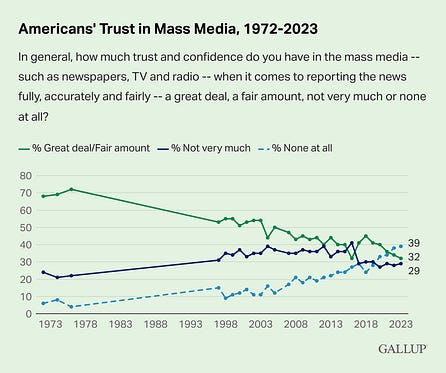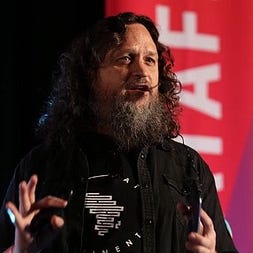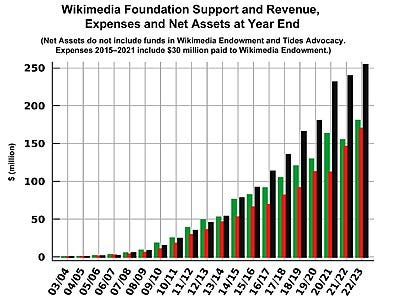You’re reading the My News Biz newsletter, which I will be sending you every other Thursday. My goal is to help you and other digital media entrepreneurs to find a viable business model that works for you. If you were forwarded this email, you can sign up here. Wikipedia is the largest, most trustworthy online service created in the internet age. And it's not for sale.It's free, global, non-profit, and crowd-sourced; it strives for a neutral stance in a media world filled with trolls, polarization, and automated disinformationYou’re reading the My News Biz newsletter, which I send every other week. My goal is to help digital media entrepreneurs find viable business models.
The value of trustIt’s hard to find information you can trust these days. Powerful algorithm-driven marketing machines flood us with news and reviews about everything from pizza to politics, from fashion to fascism. (See Gallup study tracking confidence in mass media.) My antidote. I routinely refer to Wikipedia at least once a day for some facts. Often it’s something about science — nuclear fission, primate evolution, or the language of whales. Or it’s about political figures and movements — because Wikipedia avoids partisan spin. Wikipedia is enormously valuable — effectively priceless. In economic terms, it’s a public service, like a public library or a museum. It exists to serve the public, not to make a profit. But its market value is, in theory at least, as great as Google or Facebook or Netflix. It benefits from network effects — the more people who use it, and the more content it contains, the more valuable it is to each user. Wikipedia publishes in more than 60 languages and has at least 1 million articles in each of 18 different languages (6.8 million of them in English). Not the last word — the firstUniversity professors and high school teachers despair when students cite Wikipedia as a source for their papers. But I encourage students to use it as a starting point, just as previous generations used the volumes of the Encyclopedia Britannica. Consider all the sources in the Wikipedia article, I tell them. Where did the information come from? The best articles list multiple sources with many points of view, I say. Use the exercise as a way to sharpen your skills at evaluating the quality of those sources and the information they publish. ‘Don’t trust us’Because Wikipedia itself says that its information is simply an “open collaboration” in which anyone can contribute, “some articles are of the highest quality of scholarship” while “others are admittedly complete rubbish.” Their disclaimer goes on: “Also, since Wikipedia can be edited by anyone at any time, articles may be prone to errors, including vandalism, so Wikipedia is not a reliable source.” The English profile of a Spanish public figure, for example, won’t have as much information or as many sources as the Spanish language version. And vice versa. Here’s the English language profile of controversial American politician Liz Cheney, and here’s the Spanish version, which has maybe one-tenth the detail. But that short piece might be perfectly adequate for the Spanish audience. However, I find Wikipedia’s admission of fallibility, their requests for further sources, and their striving for depth and context to be more reassuring than others’ claims of publishing “truth.” A ‘neutral point of view’When I want to escape polarization while searching for information, I go to Wikipedia. Here are some of their standards, from their web page:
An investigative journalist’s viewpointA big advocate for the value of Wikipedia is Justin Arenstein, a leader in investigative journalism globally and founder of Code for Africa. At a United Nations event in New York, he questioned the value of current media literacy projects of the U.S. and European Union to fight disinformation. These projects aim to teach citizens how to identify false or misleading information in media.
Here are some of his remarks on video: “Wikipedia is basically the biggest knowledge content platform on the planet. And it’s excellent because it’s peer reviewed. Every piece of information in there is checked by others, normal citizens, who do not get paid.” Wikipedia’s fundingThe Wikimedia Foundation hosts Wikipedia. As of Dec. 31, 2023, it had annual revenues of $180.2 million, annual expenses of $169 million, net assets of $255 million and an endowment that surpassed $100 million in June 2021. It employs over 700 staff and contractors. Who ‘owns’ it. Wikipedia’s founder Jimmy Wales has said over and over again that it’s not for sale. The information on its website is a public service and should be treated as such. He doesn’t own Wikipedia. Nobody does, despite rumors to the contrary. And he isn’t trying to sell it — also contrary to the rumor mill. Why we support itAgain, trustworthy information is hard to find these days. My wife and I subscribe to a number of news publications that adhere to the highest ethical standards and professional practices. Mostly trustworthy. These news sources don’t always get it right, and they sometimes betray their biases in their headlines, the topics they choose, and the people they interview for commentary. We will pay for an 80% level of confidence. In a lifelong career as a paid, trained skeptic, I’ve learned to live with a certain level of uncertainty. In addition to paying for news, we donate about $1 a day to Wikipedia, $380 a year. It has arguably the largest worldwide collection of information on human knowledge that has ever existed. And its mission is one we agree with. They care about the quality of their work. Are you convinced? Trust and credibility have tremendous economic value for publishers of news and information. If you are a publisher, be one of those trustworthy sources. Adopt standards of transparency that will persuade your viewers, listeners, or readers to trust your work and recommend it to others. Build your business model on trust. Some models for building trust: What are some of the sources you find trustworthy? Please leave me a comment, and I’ll publish the results. You're currently a free subscriber to My News Biz. For the full experience, upgrade your subscription. |
EL PERIÓDICO DE LOS PERIÓDICOS. SOMOS NOTICIAS. Para publicar, contactar: aliazon.comercialyventas@gmail.com
Páginas
- Inicio
- NACIONAL ESPAÑA
- INTERNACIONAL
- BOLETINES DIARIOS
- PORTADAS
- SOCIEDAD
- POLÍTICA
- SECCIONES
- ARTÍCULOS
- ECONOMÍA
- CULTURA
- NOTICIAS TURISMO
- PERIODISTAS
- REVISTAS
- NOTICIERO
- HEMEROTECAS
- REDES SOCIALES
- EVENTOS
- CLIMA
- PUBLICIDAD
- MENÚ
- COMUNICADOS DE PRENSA
- BOLETINES INFORMATIVOS
- MUNDO RURAL
- FEMINISMO
- GASTRONOMÍA
- EMPRESAS
- EL TIEMPO
- RADIO Y TELEVISIÓN
- CIENCIA
- MOTOR
- CONSUMO
- EDUCACIÓN
- TOROS
- OPINIÓN
- BLOGS
- ELECCIONES
- PODCASTS
- PASATIEMPOS
- NEWSLETTERS
- EMPLEO
- SERVICIOS
- SALUD
- ARTE
- BELLEZA
- LIBROS
- NEGOCIOS
- MEDIO AMBIENTE
- TECNOLOGÍA
- LOTERÍAS Y JUEGOS
- MODA
- OTROS
- HORÓSCOPO
- LIFESTYLE
martes, 2 de julio de 2024
Wikipedia is the largest, most trustworthy online service created in the internet age. And it's not for sale.
Suscribirse a:
Enviar comentarios (Atom)
ARTÍCULOS
¿Tienes información sobre alguna noticia interesante? aliazon.comercialyventas@gmail.com
ROPA Y COMPLEMENTOS ALIAZON
ROPA Y COMPLEMENTOS
OPINIÓN

Opinión y análisis // Diariocrítico.com
Artículos de Opinión | El Independiente
RSS de noticias de opinion
OPINION EL CONFIDENCIAL
Estrella Digital :: Últimas opiniones
Nuevatribuna :: Últimas opiniones
OPINIÓN-KHAMENEI
ÚLTIMAS NOTICIAS

ÚLTIMAS NOTICIAS
Últimas noticias // Diariocrítico.com
Estrella Digital :: Últimas noticias
Comentarios en: Últimas noticias
RSS de noticias de ultima-hora
PORTADAS
RSS de noticias de portada
NACIONAL ESPAÑA

Noticias nacionales | Diariocritico // Diariocrítico.com
MUNDO-KHAMENEI
CULTURA
ARTE
Arte y Cultura // Diariocrítico.com
TEATRO
Salud y vida saludable // Diariocrítico.com
SEXUALIDAD
Sexualidad y salud sexual y para disfrutar de las relaciones en pareja // Diariocrítico.com
SALUD
HISTORIA
Canal Historia // Diariocrítico.com
TURISMO
SOCIEDAD

Sociedad EL CONFIDENCIAL
LIFESTYLE
Estilo Hombre
MODA
CRÓNICA ROSA
Noticias del Corazón // Diariocrítico.com
LO MÁS LEÍDO
Lo más leido de la semana // Diariocrítico.com
CIENCIA
LIBROS
Noticias de libros, editoriales, autores y premios literarios // Diariocrítico.com
ECONOMÍA

Economía-EL CONFIDENCIAL
La actualidad económica en vivo - France 24
RSS de noticias de economia
COMENTARIOS DE ECONOMÍA
Comentarios de la Economía // Diariocrítico.com
Noticias economicas | Diariocritico // Diariocrítico.com
MERCADOS

Mercados - EL CONFIDENCIAL
EMPRESAS

Empresas - EL CONFIDENCIAL
FINANZAS








No hay comentarios:
Publicar un comentario